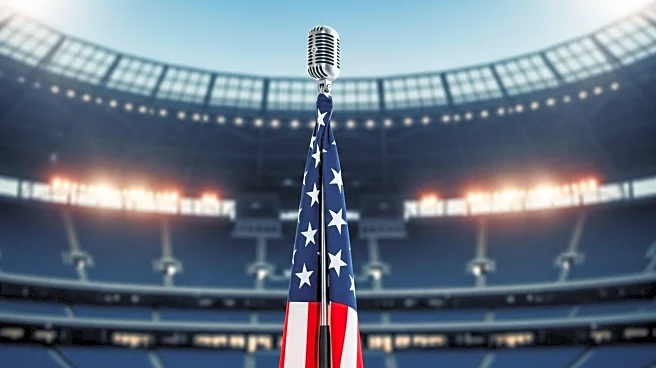What's Happening?
Country singer Lee Greenwood has been suggested by House Speaker Mike Johnson to replace Bad Bunny for the 2026 Super Bowl halftime show. Greenwood expressed his enthusiasm for the idea, stating he would be a great performer for the event. He highlighted his experience performing for NFL teams during Salute to Service games and mentioned his upcoming halftime performance for the Dallas Cowboys. Greenwood, known for his patriotic anthem 'God Bless the USA,' has a history of performing at significant events, including President Trump's inauguration. Johnson criticized the NFL's choice of Bad Bunny, questioning his appeal to a broader audience and suggesting Greenwood as a more suitable performer.
Why It's Important?
The suggestion to replace Bad Bunny with Lee Greenwood for the Super Bowl halftime show reflects ongoing cultural and political debates in the U.S. entertainment industry. Greenwood's potential involvement could appeal to conservative audiences and those who value patriotic themes. The decision could impact the NFL's viewership demographics, as the Super Bowl is a major cultural event with significant advertising and sponsorship implications. The controversy also highlights the intersection of politics and entertainment, with figures like President Trump and Speaker Johnson influencing public opinion on entertainment choices.
What's Next?
If Greenwood is selected for the halftime show, it could lead to a shift in the NFL's approach to entertainment, potentially prioritizing performers with broader appeal to conservative audiences. The decision may provoke reactions from various stakeholders, including fans, advertisers, and cultural commentators. The NFL will need to balance these interests while maintaining the Super Bowl's status as a premier entertainment event. Further discussions and negotiations are likely as the event approaches, with potential implications for future halftime show selections.
Beyond the Headlines
The debate over the Super Bowl halftime show performer underscores broader cultural tensions in the U.S., where entertainment choices can reflect political and social divides. Greenwood's involvement could symbolize a shift towards more traditional and patriotic themes in mainstream entertainment. This development may influence other cultural events and performances, as organizers consider the political and social implications of their choices.










